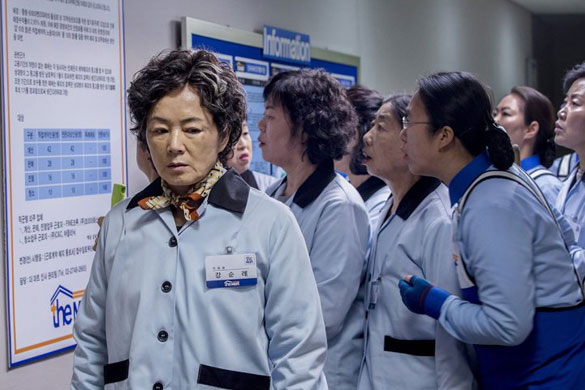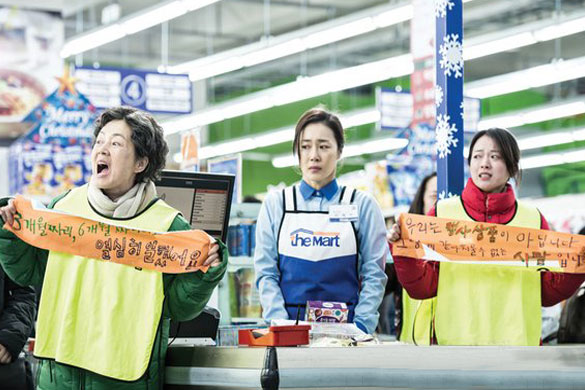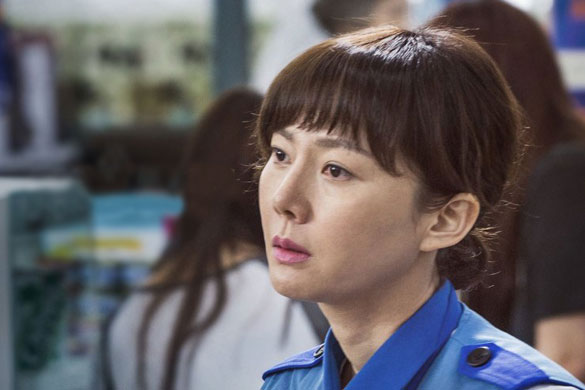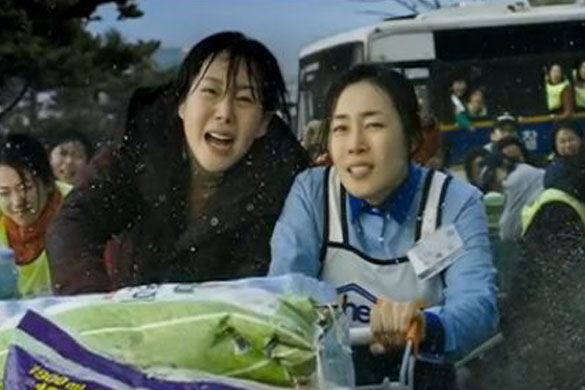"The customer is king!... Work for customer satisfaction!...
When the customer prospers, the company prospers!... We love customers!..."
Synopsis:
Seon-hee (Yeom Jeong-ah) is one of a number of female workers employed under a temporary contract by retail outlet Mart. The diligence with which she undertakes her work and her willingness to put the needs of the company above her own - agreeing to almost endless, often unpaid overtime, in the process - combined with her obvious and seemingly unshakeable belief in the company's values and its 'the customer is king' mantra has resulted in her being told that she, in the near future, will be made a permanent member of staff complete with the extra job security such a position brings.
However, Seon-hee's (understandable) feeling that her relationship with her employers is both honest and open is not just called into question by the sudden announcement - given via a noticeboard list - that many of her colleagues are to have their temporary contracts terminated but is, in fact, torn utterly asunder by the realisation that Seon-hee herself is one of those who will lose their jobs. Scared for their futures but determined to voice their grievances officially and draw attention to their rights as employees, the women hurriedly form a workers' union but when Mart's management fail to even turn up to a negotiation meeting Seon-hee and her colleagues are left with little option but to take a stand by going on strike.
The problem is, as they begin their industrial action, these ultimately innocent ladies have no idea how protracted and difficult their situation will soon become, nor are they aware of the sheer brutality with which their calls for justice will be met...
Review:
Any discussion of Korean cinema depictions of workers’ rights (or the lack thereof), employee mistreatment and struggles for justice through unionisation can be virtually guaranteed to include mention of Park Kwang-su seminal 1995 film 'A Single Spark', based on the life of Jeon Tae-il - a young man whose calls for compliance with labour laws culminated in him committing suicide by self-immolation in 1970; posthumously becoming a symbol for Korea's entire labour movement.
While it would be difficult - some might say nigh on impossible - for any subsequent film on a similar subject to come even close to A Single Spark's importance, with 'Cart' (based on a true-life incident that occurred in 2007) director Boo Ji-young deftly shows that corporate bullying and even violence was still taking place against workers almost 40 years after Jeon Tae-il's death.
The early stages of 'Cart' juxtapose Seon-hee's family life - the daily trials and tribulations of a mother taking care of her two children - with the sometimes difficult relationships between the other female workers at Mart and the faceless (from the female employees' perspective, at least), unceasing demands of company bureaucrats dictated through lower level intermediaries, and instantly we are shown that the caring and emotionality (ie humanity) so important to Seon-hee (and, by implication, the same for the other temporary workers) in her private life sadly has no place whatsoever in her job.
 |
Those who are aware of Asian companies' practice of gathering employees together daily, prior to the start of business, to rev them up for the day's work by collectively repeating a proactive mantra, so to speak, will find Seon-hee and her colleagues' chanting of 'The customer is king... Work for customer satisfaction...' familiar territory in one respect but the adding in of the exalting of Seon-hee by her superior as the unquestionably perfect employee, in front of the entire workforce - her every action to be aspired to and indeed emulated - appears (in my opinion, deliberately so) as all too similar to a totalitarian regime indoctrinating, even brainwashing, the masses to its own ends.
Not only that, but the aforementioned 'customer is king' mantra instantly screams of what would likely (and indeed does) happen when a customer complaint is aimed directly at one of the temporary workers, underlining from almost the outset just how unimportant these female workers, their rights and even their lives are deemed to be by their employers.
Of course, any such story will always become a battle between humanity/moral right and cold, uncaring bureaucracy but Boo Ji-young also uses the fact that these increasingly badly treated workers are women to subtly make a statement on issues faced by women in Korean society as a result of male prejudices:
As the women stage a sit-in of their workplace they begin to increasingly bond with each other - their emotional connection and the importance of those they are involved with and responsible for sitting at the forefront of their minds while their situation threatens their livelihoods and therefore those very parts of their lives - while the repeated attitude of the company's (male) management is, and I quote: "They're only women, they don't matter".
In fact, the subsequent violence inflicted on them (again, instigated by the male company bosses) could even be said to raise the question of whether these cold, profits-driven men consider the women as human at all and if that is, again, because they are female.
 |
Seon-hee's difficult relationship with her young son and, in turn, his burgeoning relationship with a feisty young girl form the main subplots of 'Cart' and just as the main narrative ultimately shows growing strength, self esteem and self worth in the face of seemingly insurmountable adversity these subplots, too, ultimately speak clearly of how much Seon-hee grows as an individual as a result of her colleagues' belief in her and in spite of the male bosses' preconceptions of, and lack of respect for, women.
As already mentioned, 'Cart’ is based on a true story and, as such, as well as all of the above allowing the film to serve as both a human and humane tale of female empowerment, it also stands as a reminder of shocking workplace injustices in spite of labour laws; injustices that in the 21st century should be no more than footnotes in history.
Summary:
While it would be difficult - some might say nigh on impossible - for any film on the subject of workers' rights and labour laws to come even close to the importance of 1995's 'A Single Spark', with 'Cart' (based on a true-life incident that occurred in 2007) Boo Ji-young nonetheless successfully combines an insightful story of workplace injustices with a tale of female empowerment that is both human and humane.
'Cart' (카트) / 2014 / Directed by Boo Ji-Young
|





